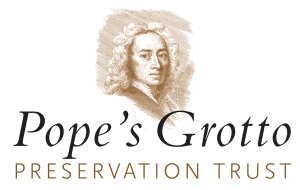Alexander Pope’s arrival in Twickenham in the spring of 1719 coincided with the growing attraction of the place as a seasonal resort for Londoners. Lying along the Middlesex bank of the Thames, more or less equidistant between the Royal Palaces of Richmond and Hampton Court, Twickenham with its cleaner air was only waiting for the arrival of fashionable society. It was the start of a defining period in Twickenham’s social history.
Pope built his villa overlooking the Thames and then laid out a 5-acre garden behind it on the other side of the road. This garden would become one of the most important landscapes in the history of European garden design. It is sometimes considered to be the birthplace of the English landscape garden: a style of naturalistic garden which would, through the course of the 18th and 19th centuries, influence gardens in Europe and beyond. To gain private access to his garden, he constructed a tunnel from his cellar under the road. Later, he decorated this tunnel to form his famous grotto.
The villa was demolished in 1808 and the garden has been progressively overlaid by housing, sports facilities and a car park. Thus, the grotto is now the only remaining part of Pope’s physical works.
Pope’s Grotto Preservation Trust has commissioned Professor Paul Richens to create an interactive digital reconstruction of the villa and garden, together with the adjacent Thames and the buildings along the river, using the same technology which makes computer games so engrossing. This allows the audience to gain some understanding of Twickenham in 1740 and, in particular, Pope’s villa and garden, which have been meticulously researched and reconstructed from historical sources. At the same time, we commissioned storyteller Giles Abbott to write and perform the commentary.
The experience starts in a wherry (rowing boat) on the Thames at Twickenham with a local waterman rowing you upriver. You disembark on the lawn in front of Pope’s Villa and walk through the grotto into the garden. Here you can explore the shell temple, the spiral mound, the kitchen garden, the pineapple house, the quincunxes, the vineyard, Pope’s obelisk to his mother and many other features. As you approach the garden’s various features, appropriate quotations from Pope will be voiced.
The fully-interactive version was shown to an audience of about 150 people in-person in February (you can read a review of the event in The Critic magazine). We realise that many people were unable to come to this event so we are now making some of the reconstruction available to a wider public. Technological limitations prevent us from reliably streaming the video output from the interactive model so we are making pre-recorded videos available to general public. The introduction, the river scene and the garden scene were shown to attendees at our on-line event “The Making of a Virtual Arcadia” on 22nd June 2022. The remaining video is a recording of the event itself, including the discussion and the question and answer session.
Please note that the videos are best watched in full-screen mode.
Introduction by Professor Judith Hawley
The river scene
The garden scene
Event recording: Building a Virtual Arcadia
Professor Paul Richens is a registered architect and has been director of Applied Research for Cambridge Ltd., chairman of the Construction Industry Computer Association and Vice-Master of Churchill College Cambridge. He held a chair in Architectural Computing at the University of Bath. He worked on software for the design of buildings and structures with complex geometry and the application of computers to various aspects of architectural history, in particular the virtual reconstruction of historic landscapes and gardens. More recently he was appointed to a part-time research chair at the University of Westminster, where he continues to work on the virtual reconstruction of historic buildings and cultural landscapes.
Giles Abbott is an award-winning storyteller and an experienced vocal coach. He tells stories for all ages at club nights, festivals and schools. He has worked with major companies such as ITV and Red Bull using vocal skills to enhance presentations and speechwriting as well as teaching voice at drama schools. He has previously created and performed two works for the Trust: ‘A Search for Perfection’ and, more recently ‘The Verse and the Curse’.
A Virtual Arcadia is supported by The National Lottery Heritage Fund and Arts Council England.


